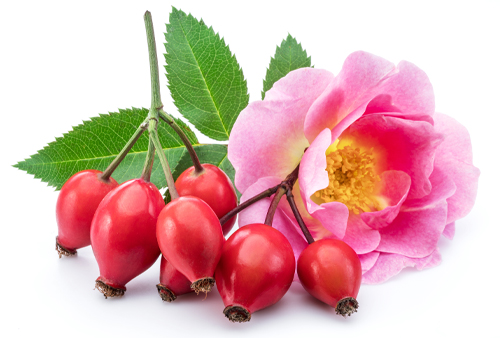All Natural, Homemade Rosehip Moisturizer
By Juliane Morris

Oils like coconut oil, jojoba oil, avocado oil, olive oil, sesame oil and tea tree oil (an essential oil) are popular natural skincare ingredients.
Rosehip oil, in particular, has earned esteemed credit lately for creating healthy, gorgeous skin.
Extracted from the seeds of various rose bushes, rosehip oil was historically used for skin nourishment and healing qualities by the Egyptians, Native Americans and Mayans.
Some dermatologists use topical formulations of rosehip oil to treat inflammatory skin conditions because of its abundance in essential fatty acids (like linoleic and oleic acid), antioxidants and vitamins (like A, E, C and D).
Rosehip oil is considered a dry oil that absorbs into the skin relatively quickly due in part to its neutral pH and does not cause clogged pores or leave traces of an oily film.
There is evidence that rosehip oil used on the skin promotes faster healing of wounds and improved post-surgical scar appearance.
Serving as a natural barrier over the skin’s surface, the oil traps in moisture and protects skin from outer elements to improve inflammatory conditions like dry skin, eczema and rosacea.
Packed with beauty vitamins like Vitamin A for fine lines, C for collagen production, E for repairing damage from the sun, and retinoids for clearing acne, a moisturizer made with Rosehip oil should allow you to replace other store-bought creams that aren’t as versatile.
Rosehip oil has a short shelf life, tending to go rancid quickly once exposed to air, so buying small bottles and keeping them refrigerated is recommended.
Homemade Facial Moisturizer Recipe with Rosehip Oil
Ingredients
Makes about 6 ounces.
- 1/2 cup organic shea butter
- 2 Tbsp. organic jojoba oil
- 1 Tbsp. organic rosehip seed oil
- 1/8 tsp. organic vanilla bean powder
- 1 tsp. raw, local honey
Directions
- Combine shea butter and jojoba oil in a double boiler.
- Stir until shea butter melts.
- Remove mixture from heat.
- Add rosehip seed oil, vanilla bean powder, and honey.
- Transfer to a large bowl and stir to combine.
- Chill mixture in fridge for 10 minutes, or until solid.
- Whip chilled mixture until fluffy.
- Transfer to an airtight glass jar.
Pro tip: We recommend storing this lotion in the refrigerator and using within three months.



